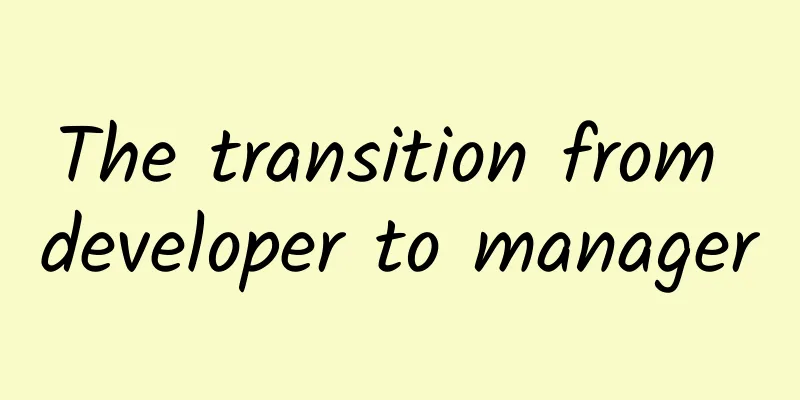The transition from developer to manager

|
The path to advancement for technical engineers The promotion path for technical engineers can be roughly divided into two directions. One is to continue to study in the technical direction as an Individual Contributor (IC), and the other is to manage a team of engineers as a manager. The IC path is relatively simple, and how far you can go mainly depends on your personal technical strength and experience. Compared with IC, the transformation to a manager can be said to be a disruptive change. The work of a manager is no longer based on the success of an individual or a project as the main goal, but focuses on the success of the entire team. This change in goal will directly change the manager's mentality and way of working, as well as the way he interacts with others. It can be said that the transformation to a manager is a more challenging choice. David Haney is from the Stack Overflow team. He is the author of the open source software dache and has published articles on InfoQ. In February of this year, Haney was promoted to engineering manager. In the few months since he became a manager, he has experienced many completely different challenges. In a recent blog post, Haney recorded in detail the management methods he has learned during this period. trust*** Haney believes that the first condition for becoming a successful manager is to gain the trust of team members. Because no one wants to work for someone they don't trust, this is often the primary factor for employees to leave, and its importance is obvious. But trust is not gained out of thin air, you must show that you are a manager worthy of trust. Haney has a certain advantage in this regard, because he has won everyone's trust with good performance during his one-year work as a team member. If you don't have the experience of working together, you need more patience to gradually build your trust. In order to gain the trust of the team, Haney specifically listed the following points, which are the most important qualities of a good manager:
Humans can’t scale like code As a developer, Haney was able to write highly scalable code. But a manager cannot scale as scalably as code. Just as it is difficult to reach a consensus among 20 attendees, it is also a difficult task to effectively manage 20 employees. Haney believes that the best number of employees reporting directly to a manager is between 4 and 10. Once you exceed this number, you can't give enough attention to everyone, which will make employees feel ignored and even doubt their importance in the team. At the same time, too many people will reduce work efficiency, so it is best to enable another manager to share your work. Make interpersonal relationships a priority For developers, interpersonal relationships often interfere with work, but when you become a manager, this becomes your focus. According to Haney, interpersonal relationships are not limited to your team, but also include dealing with other teams, which should also be a high priority. At the same time, you should try to show some flexibility to cooperate with the schedules of other teams. Another important task is to have regular one-on-one conversations with employees, giving them the opportunity to express their ideas, opinions, and difficulties, and to improve the work of managers through employee feedback. Haney has a 45-minute conversation with each employee every three weeks, which he believes has greatly helped his work. It should be noted that if the original conversation is postponed or cancelled without reason, it will make employees feel despised. Therefore, this situation should be avoided as much as possible, as it will have a great impact on employee morale. Accepting uncomfortable conversations According to Haney, when you are a developer, you may often complain to others about people or company policies that make you unhappy. This is normal. As a manager, your job is to help them deal with these problems directly. You should encourage employees to have open conversations with each other instead of whispering to colleagues in private. At the same time, good managers should also set a good example for their employees. If an employee comes to you directly with a complaint about someone, what you should do is sit both parties down together and let them express their feelings openly. Then mediate to resolve their issues. This conversation is often awkward and uncomfortable at first, but you have to accept it and make it part of the team culture. Haney believes that after a few such conversations, employees should be able to have such conversations on their own without his participation. It is important to ensure that the problem can be resolved in the end, rather than becoming more and more serious over time. Measuring your success isn’t easy Developers have a big advantage, their work is to solve a specific problem, its scope is always determined, and its results can always be seen quickly. In contrast, managers' work seems less specific, because the impact of these jobs is often intangible, such as employees' thoughts, feelings, soft skills, and their overall growth. And these jobs do not have a specific start and end time, because learning and progress are endless. Haney believes that managers’ tasks are always related to helping employees grow, and the sense of accomplishment in these jobs usually comes from feedback from others. For example, an employee expresses gratitude for your suggestions and feedback, or someone tells you that he has seen positive changes in the team, as well as praise from outside the team. These feedbacks can effectively show whether your work has met expectations, but managers need to remain patient. No one knows your actual job Developers' work is very transparent. Others can clearly understand your work content and completed tasks, and the check-in records in the code base will clearly reflect your work. In contrast, managers are always doing some work behind the scenes, which can easily give others the impression that this guy does nothing at all! Haney believes that this misunderstanding is because his conversations with employees are often private. He insists on talking to employees one-on-one about communication skills and interpersonal problems. Due to the privacy of this communication, others cannot understand the work of managers, so the misunderstanding that managers do not work is created. In Haney's view, the value of a manager's work can only be demonstrated through the continuous improvement of team members in all aspects. This is a slow process, but when the team finds that the interaction between people in the team is changing in a positive direction, they will appreciate the hard work of the manager. As employees grow and improve, the team will become stronger and more efficient, and employees will also recognize your contribution to the team. Your success is the success of others At the beginning of this blog post, Haney summarizes his point simply. Management is all about gaining trust, resolving issues through direct dialogue (even if these dialogues are sometimes uncomfortable), doing your job behind the scenes, and ensuring that your work is direct and fair. Management is highly challenging, but also extremely rewarding. ***, Haney quoted a famous saying from the animation "Futurama", which very aptly reflects the working characteristics of managers.
|
>>: Windows open-sources iOS to Windows porting technology
Recommend
An information flow advertising landing page worthy of collection by all industry professionals
We all know that the task of most landing pages i...
SEM operation: How to carry out refined SEM operation?
The algorithm-recommended information flow repres...
Beijing thunderstorm 8-level gale and hail is coming! Please take precautions
Beijing Meteorological Observatory issued a blue ...
Industry insiders reveal the unspoken rules of showgirls: If you want to be famous, you should be "smarter"
The previous "yacht scandal" has caused...
How to set the matching mode of Baidu keywords?
After the bidding account is set up, setting the ...
How to unlock your phone if you forget your password? No need to spend money to flash the phone, just press 2 buttons in 10 seconds and it will be done
In daily life, when using mobile phones, no matte...
Attention! Illustration of the 6 weak spots in the human body, any injury can be fatal
Review | Li Nannan is the vice president of Hunan...
How to salvage a screwed holiday marketing campaign
How to make holiday marketing most effective in t...
Template for planning fission activities!
1. #Split the wheel lottery game and get a gift b...
Challenging Google: Huawei, Xiaomi, OPPO and vivo jointly create a Chinese version of Google Play
The vision of "big mobile phone manufacturer...
"Reaching 2000℃! We are now in the lead..."
Qu Wei, member of the National Committee of the C...
The invisible "gorilla": What does "selective attention" bring?
Last week, for those who are interested in tennis...
Microsoft is ready to continue discussions on acquiring TikTok. How much is Microsoft's acquisition of TikTok worth?
Microsoft ready to continue discussions to acquir...
How much does hair extension cost: What are the internal page optimization techniques of Chongqing SEO optimization company?
Nowadays, the SEO industry is becoming more and m...
What would happen if you never took a shower?
appendix: If you don’t like taking showers, you m...









